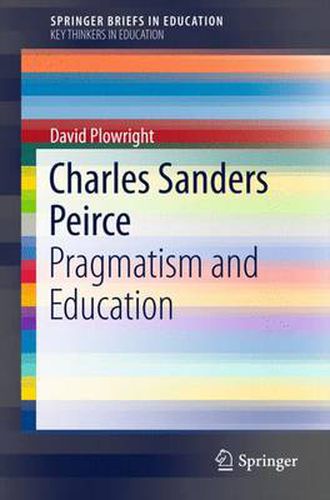Readings Newsletter
Become a Readings Member to make your shopping experience even easier.
Sign in or sign up for free!
You’re not far away from qualifying for FREE standard shipping within Australia
You’ve qualified for FREE standard shipping within Australia
The cart is loading…






This title is printed to order. This book may have been self-published. If so, we cannot guarantee the quality of the content. In the main most books will have gone through the editing process however some may not. We therefore suggest that you be aware of this before ordering this book. If in doubt check either the author or publisher’s details as we are unable to accept any returns unless they are faulty. Please contact us if you have any questions.
This book introduces a number of selected ideas from the work of Charles Sanders Peirce, the founder of pragmatism. Peirce, pronounced ‘purse’, was born in America in 1839 and died in 1914. He published little in his own lifetime and he continually struggled to become recognised as a respected author with ideas that were highly creative, original and unique. The book begins with an examination of Peirce’s life history. This is followed by an explanation of pragmatism, which states that an understanding of a concept can only be fully grasped by knowing what its practical effects are. The author then explains a number of Peirce’s ideas that are based on his pragmatic maxim: * scientific inquiry as a method of investigation and its relevance to everyday thinking
* inferential thinking based on abduction, deduction and induction and its use in educational research
* semiotics, the study of signs and its relevance to the development of conceptual understanding
* his profound and insightful ontological categories of Firstness, Secondness and
Thirdness and their application to developing an understanding of the world around us
This introductory text is written in a clear and accessible style. Numerous examples are used throughout the book to illustrate Peirce’s complex and sophisticated ideas
and to show how his thinking can be applied to education.
$9.00 standard shipping within Australia
FREE standard shipping within Australia for orders over $100.00
Express & International shipping calculated at checkout
This title is printed to order. This book may have been self-published. If so, we cannot guarantee the quality of the content. In the main most books will have gone through the editing process however some may not. We therefore suggest that you be aware of this before ordering this book. If in doubt check either the author or publisher’s details as we are unable to accept any returns unless they are faulty. Please contact us if you have any questions.
This book introduces a number of selected ideas from the work of Charles Sanders Peirce, the founder of pragmatism. Peirce, pronounced ‘purse’, was born in America in 1839 and died in 1914. He published little in his own lifetime and he continually struggled to become recognised as a respected author with ideas that were highly creative, original and unique. The book begins with an examination of Peirce’s life history. This is followed by an explanation of pragmatism, which states that an understanding of a concept can only be fully grasped by knowing what its practical effects are. The author then explains a number of Peirce’s ideas that are based on his pragmatic maxim: * scientific inquiry as a method of investigation and its relevance to everyday thinking
* inferential thinking based on abduction, deduction and induction and its use in educational research
* semiotics, the study of signs and its relevance to the development of conceptual understanding
* his profound and insightful ontological categories of Firstness, Secondness and
Thirdness and their application to developing an understanding of the world around us
This introductory text is written in a clear and accessible style. Numerous examples are used throughout the book to illustrate Peirce’s complex and sophisticated ideas
and to show how his thinking can be applied to education.